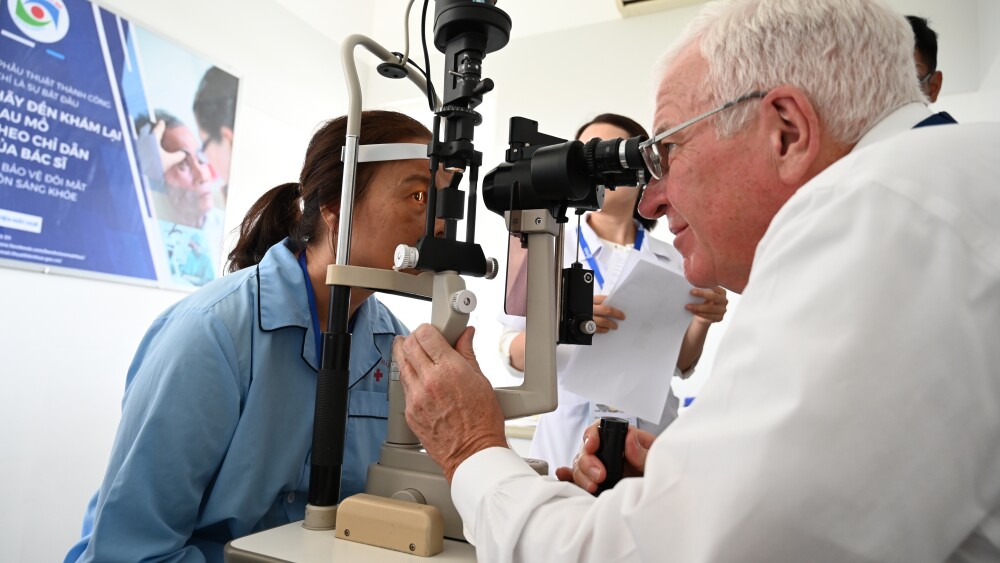Led by eye care nonprofit Orbis with support from FedEx, the training will enhance eye care professionals’ surgical skills to minimize the impact of glaucoma in Vietnam
Vietnam, May 5, 2022 – Orbis International, with generous support from FedEx, launched a new virtual Flying Eye Hospital project that will train eye care professionals across Vietnam on ways to prevent the worsening of vision loss due to glaucoma, a leading cause of blindness and visual impairment. The number of glaucoma cases in Vietnam is increasing, especially among the younger population, as the country continues to face shortages of skilled eye care professionals and limited access to quality eye care, particularly in rural areas.
“For more than 30 years, FedEx has proudly supported Orbis in the fight against avoidable blindness,” said Justin Brownlee, SVP Aviation Safety, Technology & Business Operations, FedEx Express. “We are committed to helping local communities thrive. Our ongoing support for Orbis provides them with access to our unique capabilities. We aim to help bring visibility to Orbis’s eye health expertise, and established footprint in the region, to improve access to quality eye care in Vietnam.”
Glaucoma is the result of damage to the nerve connecting the eye to the brain caused by pressure from fluid buildup in the eye. The ten-week virtual Flying Eye Hospital project launched today will enable participating ophthalmology residents to focus on mastering each specific step in a procedure known as trabeculectomy – a surgery that creates a new pathway for that fluid inside the eye to be drained – and to discuss surgical case management for their patients.
Training will be carried out in Vietnamese through the completion of relevant pre-learning courses on Orbis’s telemedicine platform, Cybersight; interactive live lectures delivered weekly by Orbis’s Volunteer Faculty (medical experts); and simulation training. After each live session, course participants will practice the surgical step they learned that week on artificial eyes before submitting a video of themselves performing the simulated technique for review and feedback from Volunteer Faculty.
Simulation training uses devices such as artificial eyes to allow complex surgical procedures to be broken down into smaller parts, giving eye care professionals the opportunity to practice each step as many times as they need to get it right, something that is not possible with an actual patient. This reduces the learning curve for difficult techniques, accelerates skill acquisition and improves outcomes for patients.
Orbis’s Flying Eye Hospital is the world’s only fully accredited ophthalmic teaching hospital on board an MD-10 aircraft. Celebrating its 40th anniversary this year, the Flying Eye Hospital has traveled the world delivering best-in-class training for eye care professionals in over 95 countries. In 2020, Orbis reimagined in-person Flying Eye Hospital trainings as virtual ones to ensure that eye care teams could still access critical training safely during the pandemic. Orbis reached nine countries in 2020 and 34 countries in 2021 through virtual Flying Eye Hospital projects.
“Virtual training projects enabled by our incredible volunteers and supporters have allowed us to digitally extend our impact and will continue to be a vital part of our programming, even as we eagerly anticipate a return to in-person training on the Flying Eye Hospital later this year,” said Derek Hodkey, President & CEO of Orbis International. “The generous support of partners like FedEx has made it possible for us not only to continue, but to also enhance our ophthalmic training to eye care teams around the world that need it most.”
FedEx has supported Orbis for more than 30 years in the fight against avoidable blindness through more than US$22 million in donations and in-kind shipping. Last year, FedEx announced its renewed commitment to Orbis’s sight-saving mission with a US$3.5 million donation to help provide financial, logistics and operational support to the organization and its Flying Eye Hospital over the following five years. FedEx has played an indispensable role in helping Orbis achieve its mission by providing aircraft parts, maintenance, and pilot training. In addition, FedEx donated the MD-10 aircraft that serves as the third-generation Flying Eye Hospital, and the aircraft is flown by FedEx pilots who volunteer their time to navigate the plane around the world on Orbis projects. The sponsorship of the virtual project launched today is part of the FedEx Cares 50 by 50 campaign to positively impact 50 million people around the world by the company’s 50th anniversary in 2023.
Orbis began collaborating with Vietnam’s ophthalmic communities through hospital-based projects in 1996 and established a permanent office in Hanoi in 2003. Orbis has been providing the highest level of expertise to support the development of eye care services and blindness prevention in Vietnam, especially in the areas of retinopathy of prematurity, pediatric and cataract services, and glaucoma treatments. In 2020, Orbis and partners educated over 174,000 people in Vietnam on how to protect their sight, completed over 41,000 community eye screenings and examinations, performed over 9,200 eye surgeries, and trained 225 eye health professionals and community health workers.
